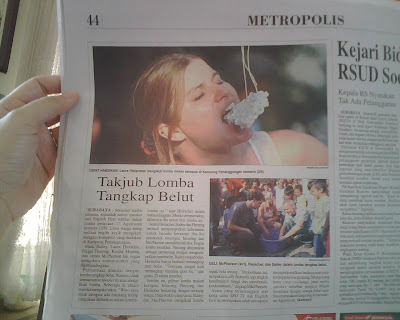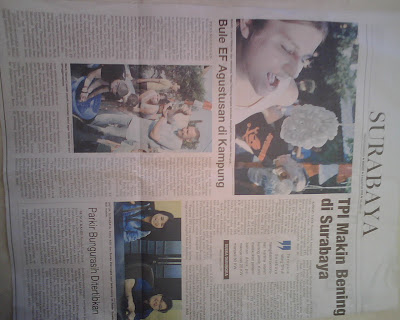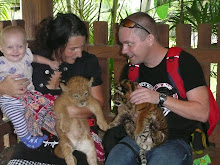
An old family friend of mine and her husband just published the following article in 'Eureka Street':
Modern parents' toy story
Daniel Donahoo and Tania Andrusiak September 12, 2008
Last night, our six-year-old son had a nightmare. Despite reassurance and a cuddle in mum and dad's bed, his eyes were open and his brain was switched on. He had decided he wasn't going back to sleep. So, at five in the morning, we found ourselves in the peacefulness of the pre-dawn, drinking hot chocolates and musing on the important topics of our world.
Like most parents, we're concerned about what it means to be raising children in this modern world. So concerned that we've turned to researching and writing to help ourselves and others make sense of the cavalcade of images and ideas our children are exposed to. Media violence, advertising and commercialisation are topics discussed regularly at our dinner table. We try to break the issues down into concepts and words our children understand.
But over that hot chocolate conversation we got a glimpse of what it is we're trying to achieve. In between sips, our son told us he was going to save up his money to buy a Ninja Turtle: one of those small, green karate machines which, along with Pokemon, Bratz and Shrek, represent all that we tried to flee by tree-changing to a more self-sufficient lifestyle in rural Victoria.
And while we've managed to keep most of that stuff out of our household up to now, when our six-year-old told us he wanted to buy one, we just smiled.
We smiled because our son has been indoctrinated. Long before he could speak, he has heard us rant about advertising and commercialisation. He can't watch commercial TV or enter a retail zone without us deconstructing the ads — or deconstructing them himself. He talks about how he feels when other kids engage in violent play, and we have long had a 'no gunplay' rule in our house.
Despite all this, his statement that he'd like a Ninja Turtle demonstrates two things.
The first is that our children are not our children. They, like all of us, live in a world saturated in brands, commercialism and all manner of hyped-up toys. Completely denying that means living some sort of reclusive lifestyle that can cut people off from more than just popular culture: believe us — we know.
The second is that in expressing his wish, we've experienced a greater parenting triumph than if he never asked at all. It shows that he feels enough security and autonomy to tell us he'd like to buy a Ninja Turtle, even if it's something he knows we might not like.
How he will interact with his heart's desire will depend on how well he's been supported to be a good player. Is fighting all Ninja Turtles do? Hell no! Depending on the day, they may be park rangers, restaurateurs, funky dancers or loving daddies.
They may earn different names, or be dressed in original garments he cuts out from fabric scraps. Our kids are not limited by the imaginations of middle-aged, money-hungry toy creators — but, of course, it helps that they have never seen the show.
Parenting is a dynamic process. We constantly reconsider and re-assess what's most important to us, and our children. In asking those questions, we find better ways to support our children to grow into the most contented, well-adjusted humans they can be. It's easy to get hung up on the details of a toy here or a slight difference in value there. It's harder to look beyond the hype and see the opportunities in childhood experiences.
We all realise that good food, water, shelter, safety, warmth and a basic education are critically important. But beyond that, children need other things to feed their minds and spirits. Put simply, these things are belonging (strong relationships rooted in family and community), meaning (purpose and reasons for doing what they do and being who they are) and independence (a strong sense of self and an ability to make their own choices).
If we make these our parenting focus, we might find that our children have the capacity to look beyond the trappings of commercialism. They may dive into it from time to time, but they will recognise the superficial nature of bargain-basement belonging, meaning and independence built solely around the spending of money on shiny, new toys.
Children who derive enough belonging, independence and meaning from family, friends and a strong community will not place nearly as much emphasis on consumer goods, or try to fill a hole with the empty promises of advertisers. No plastic reptile will ever provide the joy of a visit to his Grandma — and our son knows it.
So, we're not too concerned that he wants a Ninja Turtle. Sure, it presents us with a new range of challenges, but we know that the core values we've been teaching him will hold. He knows that we will always enjoy animated conversations about the dilemmas of living in the modern world. He expresses concern that our values may not concur, and learns that people can hold different beliefs, yet still honour one another deeply.
He demonstrates respect towards his mum's dislike of violence. And yet, he feels safe enough to challenge what his parents say, and has the autonomy to make independent decisions about what he likes and wants to play with. He hears that we trust his ability to think for himself.
And he does this all at our kitchen table, before sunrise, where we couldn't feel more at home.
Hmmmm.
Good article, but sometimes I think people spend so much time stressing about living in the modern world that they forget to actually live in the modern world.
A hundred years ago, kids read 'Ivanhoe' and played with lead soldiers. When I was a kid, they watched 'Star Wars' and played with the action figures. These days it's TMNT, Naruto, One-piece, etc.
Point is, when we played with our Star Wars(tm) figures as kids, we weren't being blind consumers, recreating someone else's plots and story arcs. The Star Wars franchise was a jumping-off point for kids' play. It showed the sort of kids who probably would never read a book by choice that it was possible to create inventive scenarios, characters and fantasy worlds; and the action figures gave them a vehicle and a matrix of sorts for these imaginings.
Last week I was watching Zirri (4), Jax (3) and even Iola playing with TMNT figures. And while their play was varied and creative (including an off-the-cuff game called 'Ask Mr Turtle' invented by Zirri to keep me playing with him instead of talking to the other adults!), at no point did it actually intersect with the plots or zeitgest of the comic, film or TV turtle-worlds.
Maybe Tanya should hook her six-year-old up with the original comics and graphic novels. They're a very dark and satirical treatment of a range of contemporary issues, including some of the very concerns regarding media portrayals of violence and the commercialisation of children that Daniel and Tanya raise in their article!
Speaking of which, while I'm frankly horrified by the invasion of our mental space by modern advertising culture, and by the rapidity with which I observe commercially generated memes spread through the teen and sub-teen population (particularly the 'tween' phenomenon: it kind of weirds me out at work when I see mothers in full Islamic garb dressing their seven-year-old daughters like cheap hookers), I find it hard, intellectually and objectively, to work out where to draw the line.
Picture this: A simple toymaker (let's call him Gepetto for want of a more original name) notices that the children in his village are fascinated by the new train line that's been laid nearby, and exploits this interest by making a bunch of simple wooden trains, just in time for Christmas (i.e. just the kind of basic, old-school toy that most of my more socially aware friends would buy for their kids).
He makes so much money that he's able to employ some apprentices, open a small factory, and begin exporting his toys to surrounding towns and villages. Pretty soon, 'Gepetto Toys ™' is a household name in his small part of the world.
A few years later, Gepetto is enjoying a quiet beer with a friend—a friend who's been working on a translation of 'Grimms' Fairy Tales'—when inspiration strikes. Kids love the stories, kids love the toys. Why not combine the two worlds and design a line of toys that complement the book? China-doll Snow White's, stuffed wolves, wooden goats on wheels—how could they lose?
Pretty soon Gepetto and his mate are collaborating on new stories, which are published concurrently with the release of the corresponding line of Gepetto toys. Kids eagerly await the latest offerings, and Gepetto starts utilising the services of town criers to let people know when they will become available (oddly enough, this is usually just before Christmas...).
A somewhat laboured analogy, but you get the drift. Where do I draw the line with Iola? Is it possible to draw a line, given the all-pervading media saturation we're experiencing in the early part of the 21st century?
It scares the shit out of me that kids can hum the McDonalds theme song before they can talk, and that billions and billions of dollars worth of advertising is aimed at persuading Iola that not only does she desperately need the latest Bratz™ doll, but that the best way to get it is to relentlessly nag her parents.
On the other hand, thus it has always been, and thus it will always be. A hundred years ago I would have been freaking out about the fact that Iola would be unable to get a decent education without also being indoctrinated into a repressive and narrow-minded religion, or that she wanted to glorify the horrendous suffering of the Crimean or Boer wars by playing with lead soldiers, or that she never would have wanted that doll with the wind-up voice box if her friends at school didn't have one too…
I dunno. It's all too damn hard. Iola's thirteen months old, and she already loves dancing to the Wiggles™ or Bananas in Pyjamas™. These are both big, corporate products, with extensive product lines, marketing departments etc, but they got that big because they're bloody good at what they do. Seriously, the educational content of the Wiggles™ is far superior to most of the material we use for the very young learners at the school where I work.
Well, that's my two bob's worth... Any thoughts on all this would be appreciated.






















